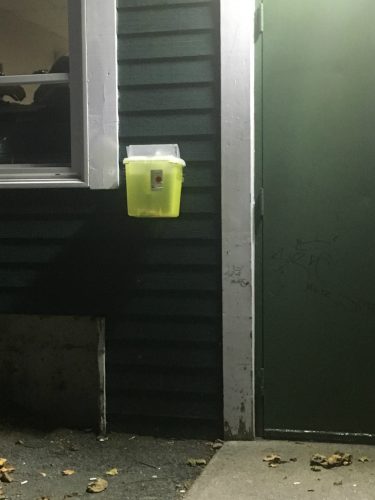Addiction
Former inmate hopes to create support system for people with addiction
Robert Cross's plans include more home-like housing and a support network

caption
Meeting place outside of Metro Turning Point on Barrington Street, where some residents go to use drugs off site. Robert Cross and others met here to discuss his idea for a support system
caption
Meeting place outside of Metro Turning Point on Barrington Street, where some residents go to use drugs off site. Robert Cross and others met here to discuss his idea for a support system.It is a Friday evening in October and a small group of people is huddled outside of Metro Turning Point, on Barrington Street in downtown Halifax, to talk about an idea for a new project.
Among them is Robert Cross, a man who is recovering from 15 years of heroin addiction, a dependency that began after his three-year-old daughter died of leukemia.
Rolling up his shirt and pants, Cross displays a number of his scars that have earned him the name Scarface. The most noticeable of these, he says, is the result of a fight with a guard while he served time in a Nova Scotia prison. An incident, which he believes, changed his perspective on life and “gave him compassion.”
Now, Cross is gathering people determined to improve their lives by starting an organization that provides specialized housing for former inmates with addiction. The program would have former inmates work as a support network to help each other find apartments in Halifax.
“Imagine you fill it with furniture, food, clothing, everything they need,” says Cross. “How would you feel instead of coming here?”
Advocates on homelessness argue that people who have just been released from prison and are in need of housing need more options. Cross says sending them to shelters like Metro Turning Point, that are “cesspools for drugs and violence,” presents a double risk to former inmates struggling with addiction.
Pam Chessel is a Halifax woman in her twelfth year of recovery from heroin addiction. She says she’s witnessed drug dealers at Metro Turning Point target residents who have recently been released from prison.
“They know they’re coming with a little bit of money and freedom,” says Chessel. She adds that when their money runs out, many turn to crime to support their drug dependency. “It’s a revolving door and our taxpayers pay for it.”

caption
Metro Turning Point staff have encouraged drug users staying at the shelter to safely dispose of syringes before entering the building.Chessel points a finger back to the province’s criminal justice system, which continues to view aspects of addiction as crime and not a public health issue. She says there are not enough long-term treatment programs in prisons and Halifax as a whole.
“Do you know what their only hope is? Girls like us that are half-sober, we take them in and we support them,” says Chessel. “Still, it shouldn’t be left to us.”
Melissa Phillips, director of homelessness and housing at Shelter Nova Scotia, says the shelters they operate work to minimize risk to residents through harm reduction strategies.
“We do not believe that shelter is housing,” says Phillips. “If someone is in recovery, and they see the shelter as a trigger environment, it’s our interest to work with them to find a more appropriate option as quickly as possible.”
Yet, Cross and Chessel argue that there is a lack of services specifically suited to meet the challenges faced by persons who have lived through incarceration and drug addiction.
Cross, who also is also a writer and photographer, hopes publishing a book of his work can help him receive support for the project and bring new awareness to a dimension of homelessness in Halifax.
